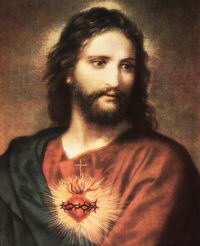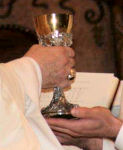
Daily Readings for:June 27, 2014
(Readings on USCCB website)
Collect: Grant, we pray, almighty God, that we, who glory in the Heart of your beloved Son and recall the wonders of his love for us, may be made worthy to receive an overflowing measure of grace from that fount of heavenly gifts. Through our Lord Jesus Christ, your Son, who lives and reigns with you in the unity of the Holy Spirit, one God, for ever and ever.
RECIPES
ACTIVITIES
o Celebrating the Feast of the Sacred Heart
o Enthronement to the Sacred Heart
o History of the Devotion to the Sacred Heart
o On how our Work is Love, and how we can work with Christ to save Souls with our Love
o On Parental Duty and How Parents Let Their Children Risk Chastity
PRAYERS
o Consecration to the Sacred Heart
o Enthronement of the Sacred Heart of Jesus in the Home
o Twelve Promises of Jesus to Saint Margaret Mary
o Nine First Fridays Devotion to the Sacred Heart
o Efficacious Novena to the Sacred Heart of Jesus
o Act of Reparation to the Most Sacred Heart of Jesus (Iesu dulcissime - Reparationis actus)
o A Prayer for Priests and Bishops
o Litany of the Sacred Heart of Jesus
LIBRARY
o Devotion To the Sacred Heart: Part I | P. Milward S.J.
o Devotion To the Sacred Heart: Part II | P. Milward S.J.
o Hauerietis Aquas (On the Sacred Heart) | Pope Pius XII
o Heart of Jesus, have mercy! | Pope John Paul II
o Heart of Jesus, Our Peace and Reconciliation | Pope John Paul II
o His Heart Is the Heart of the Church | Pope John Paul II
o Litany of the Twelve Promises of the Sacred Heart | Unknown
o The Human Heart of Jesus | Herbert Ratner M.D.
o The Sacred Heart And The Eucharist | Fr. John A. Hardon S.J.
o Worship Of The Physical Heart Of Christ | Fr. Bertrand de Margerie S.J.
· Ordinary Time: June 27th
· Solemnity of the Most Sacred Heart of Jesus
Old Calendar: Sacred Heart of Jesus
"I promise you in the excessive mercy of my Heart that my all-powerful love will grant to all those who receive Holy Communion on the First Fridays in nine consecutive months the grace of final perseverance; they shall not die in my disgrace, nor without receiving their sacraments. My divine Heart shall be their safe refuge in this last moment" (Jesus to St. Margaret Mary).
Sixteenth century Calvinism and seventeenth century Jansenism preached a distorted Christianity that substituted for God's love and sacrifice of His Son for all men the fearful idea that a whole section of humanity was inexorably damned.
The Church always countered this view with the infinite love of our Savior who died on the cross for all men. The institution of the feast of the Sacred Heart was soon to contribute to the creation among the faithful of a powerful current of devotion which since then has grown steadily stronger. The first Office and Mass of the Sacred Heart were composed by St. John Eudes, but the institution of the feast was a result of the appearances of our Lord to St. Margaret Mary Alacoque in 1675. The celebration of the feast was extended to the general calendar of the Church by Pius IX in 1856.
Today is the feast of St. Cyril of Alexandria, one of the metropolitan sees of the Christian Church in the east, was one of the great defenders of the faith against the heresy of Nestorius who denied the oneness of person in Jesus Christ.

The Congregation for the Clergy has today to be the World Day of Prayer for the Sanctification of Priests.
Here is the message to all priests for this important day: The Priesthood Is the Love of the Heart of Jesus and the Prayers for Priests, both for priests to say for themselves, and for lay people to say for priests.
Close to the Heart of the Son is the Heart of the Mother
The Church, in this month of June, giving us the solemnity of the Most Sacred Heart of Jesus, wishes us to understand the consequential devotion to Our Lady traditionally lived in the Marian month par excellence: the month of May. The Heart of Jesus is the See and Throne of Divine Mercy, revealed to the world in the passion, death and resurrection of Christ.
The Holy Father Pope Benedict XVI speaking of the solemnity of the Sacred Heart of Jesus two years ago said: “In biblical language, "heart" indicates the centre of the person where his sentiments and intentions dwell. In the Heart of the Redeemer we adore God's love for humanity, his will for universal salvation, his infinite mercy. Practising devotion to the Sacred Heart of Christ therefore means adoring that Heart which, after having loved us to the end, was pierced by a spear and from high on the Cross poured out blood and water, an inexhaustible source of new life” (Benedict XVI, Angelus 5 June 2005).
The call which comes from this important feast day is first of all a call to Eucharistic adoration, because in the Sacred Host the Lord Jesus is truly present and He offers each of us His Heart, His Merciful Love. To spend time in the Presence of the Eucharistic Lord, to adore Him, is the best expression of devotion to the Sacred Heart of Jesus which, as we know, spread all over the world thanks to Jesus' revelations to Saint Margherita M. Alacoque in the 17th century: “Behold the Heart which so loved mankind”!
As a prolongation and accomplishment of this message, the Lord appeared to another Sister in the 20th century revealing the abyss of His unfathomable mercy; she was Saint Faustina Kowalska who wrote in her Diary, now world famous, these words of Jesus: “I have opened my Heart as a living source of Mercy, from it all souls draw life, all approach with deep confidence this sea of Mercy. Sinners will obtain justification and the just will be strengthened in goodness. I will fill the souls of those who put their trust in My Mercy with My divine peace at the hour of their death. My daughter, continue to spread devotion to My Mercy, in doing so you will refresh My Heart which burns with the fire of compassion for sinners. Tell my priests that hardened sinners will be softened by their words if they speak of my boundless Mercy and of the compassion which My Heart feels for them. I will give priests who proclaim and exalt My Mercy wondrous power, unction to their words and I will move all the hearts to which they speak” (Book 5, 21 January 1938).
The deepest longing of Christ's Heart is that we discover how much he loves us, the extent of his tender love for creatures who, cooled by their selfishness, look only inwards at themselves, as if they were afraid to let themselves be loved unconditionally by their Creator, who asks nothing and gives all!
How society, culture, economy, politics today need this Heart! It is really true, the more man distances himself from God-Love the more he becomes 'heartless', agitated about a thousand things because he has mislaid the principal one: to let oneself be loved by Christ and to respond to this Love with our love.
Many times during history the Supreme Pontiffs have reminded humanity that without the Lord Jesus life has no real meaning, man gropes in the dark to find himself! The Servant of God John Paul II introduced the Church into the Third Millennium with a mandate to become “Apostles of Divine Mercy”. The Holy Father Pope Benedict XVI picked up where his Predecessor left off and never tires to remind us of the necessity to rediscover the merciful Heart, this infinite Love of God, who reveals Himself in our lives if we open to Him. “Open, open wide the doors to Christ” the voice of the Holy Spirit continues to say. By means of Eucharistic adoration we are “opened” from within by His invisible working in us. The Most Holy Eucharist, celebrated and adored, as the Church teaches us, is the greatest and most effective treasure of our salvation, an infinite treasure which must be safeguarded with profound respect and deepest devotion.
Close to the Heart of the Son is the Heart of the Mother whom the Church celebrates the day after the solemnity of the Sacred Heart of Jesus. Let it again be the Holy Father who illuminates us with regard to this mystery: “The heart that resembles that of Christ more than any other is without a doubt the Heart of Mary, his Immaculate Mother, and for this very reason the liturgy holds them up together for our veneration. Responding to the Virgin's invitation at Fatima, let us entrust the whole world to her Immaculate Heart, which we contemplated yesterday in a special way, so that it may experience the merciful love of God and know true peace” (Benedict XVI, Angelus 5 June 2005).
— Rev. Luciano Alimandi, Agenzia Fides 13/6/2007
Things to Do:
- From the Catholic Culture Library read Enthronement of the Sacred Heart of Jesus: Sacred Scripture by Bishop Raymond Burke.
- Bake a heart shaped cake or cookies in honor of the Sacred Heart of Jesus.